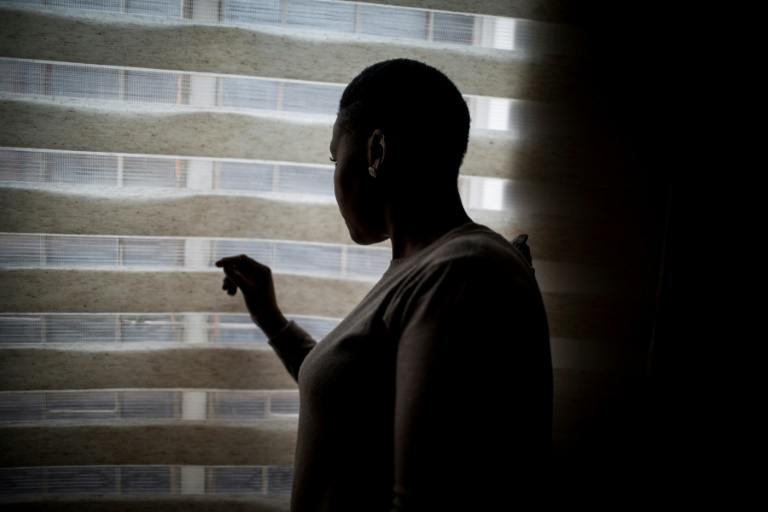Chef Nthabiseng Mabuza, 35, was on her way to work and the only passenger in a public mini-bus taxi when she was raped by the driver.
Her alleged attacker was arrested at the scene after she shouted for help to a passerby who flagged down a police patrol car. Although the suspect was held in custody for several months, he was later freed on bail.
Two years on, the case has not yet come to court and the accused has vanished.
Mabuza, a pseudonym as she did not want to be identified by her real name, is dumbfounded and angry at the police for releasing the alleged rapist and says she lives in fear that he is roaming the streets.
Her case is one example of the struggles that rape victims face and how they are treated by the police in South Africa, where tens of thousands of people are sexually assaulted each year.
“The day when I was supposed to testify, he (the alleged rapist) was nowhere to be found,” Mabuza told AFP, recounting the day last year when she went to court hoping the trial would finally start after being repeatedly postponed.
“Since then, nothing has happened,” she said, flanked by her husband, 45, at their home in Vosloorus, a middle-class township east of Johannesburg.
Her efforts to find out what was going on from the investigating officer proved futile, despite what she believes is overwhelming evidence of the brutal pre-dawn attack not far from Vosloorus.
Police Minister Fikile Mbalula has vowed to overhaul the system after admitting there is something “wrong in the administration of justice at our police stations.”
“We need to respond to the outcries of millions of our people that our police force does not respond adequately (to rape cases),” the minister told AFP in an interview.
He said his department would now do “what we are supposed to do so our police stations are functional and they do everything at their disposal to assist victims of abuse”.
– Blaming the victim –

South Africa has in recent years created specialised sexual offences courts and 57 have so far opened, but activists say more are needed
Mabuza’s husband flips through photographs showing images of his wife, the bloodied mini-bus in which she was raped, her earring ripped off during the assault and a piece of synthetic hair extension lying in the grass.
“This happened in 2015, now it is 2017, the guy was apprehended on the same day,” he said, letting out an exasperated sigh.
The couple is bewildered at how an alleged rapist could have been freed on bail.
South African police are accused by NGOs, women’s and human rights groups, academics, the media and some lawmakers of being insensitive to victims and slow in their investigations.
Conviction rates from the reported cases are low at under 10 percent, according to several independent studies.
A soon-to-be-published report, of which AFP was given an advance copy, entitled Rape Justice in South Africa, studied data from 2012 and found only 8.6 percent of cases that went to trial ended in a guilty verdict.
Prosecutors declined to prosecute 47.7 percent of the cases referred to them by the police, due to the likely success rate based on the available evidence, according to the report conducted by the South African Medical Research Council, a government-funded research agency.
It concluded that there was “substantial” under-reporting by victims due to “discriminatory police attitudes and the fear of secondary victimisation.”
Victims are “not happy with the way in which police handle their cases. There is a general lack of trust,” said Marike Keller, an activist with an advocacy charity, Sonke Gender Justice.
“There is a lot of insensitivity, a lot of victim-blaming,” she said, adding police often ask questions such as what the victim was wearing “which imply it was the victim’s fault.”
– Under-reporting –
Another survivor Lu-Meri Kruger, 35, agrees that police ask “extremely difficult questions — over and over. You become the guilty person.”
“Walking into a police station is the coldest, darkest, dustiest, most difficult time ever,” she told AFP. “That is the most difficult part of being raped.”
“You don’t know where to go to,” said Kruger, who was raped aged 15 by a man, who barged into a communal bathroom where she was taking a shower at a Cape Town backpackers lodge.
South African police not only suffer from inadequate training on how to handle rape victims, but also face high levels of work stress and a lack of transport, the Medical Research Council’s report said.
“Higher work stress was associated with holding generally less equitable and sympathetic attitudes to rape victims,” it stated.
Official crime statistics show that 51,895 cases of rape were recorded between April 2015 and March 2016.
But activists estimate that only a small fraction of rape cases are reported.
Out of dozens of NGOs helping abused women in South Africa, one single Johannesburg-based 24-hour helpline for victims, TEARS, said it had received more than 31,000 calls for the 12-month period ending in February from victims of rape and domestic abuse.
The incidence of rape in South Africa is “driven by a violent political history, as well as by structural and gender inequality,” warned the Medical Research Council study.
South Africa has in recent years created specialised sexual offences courts and 57 have so far opened, but activists say more are needed.
Download our app